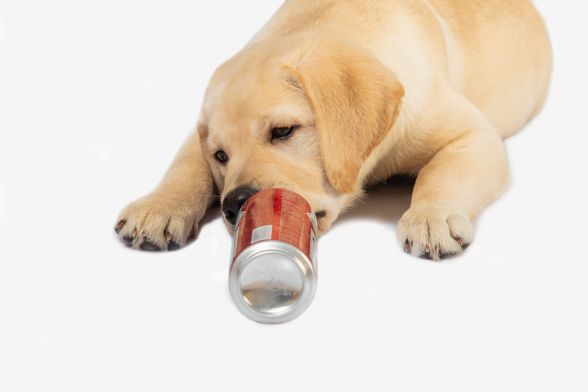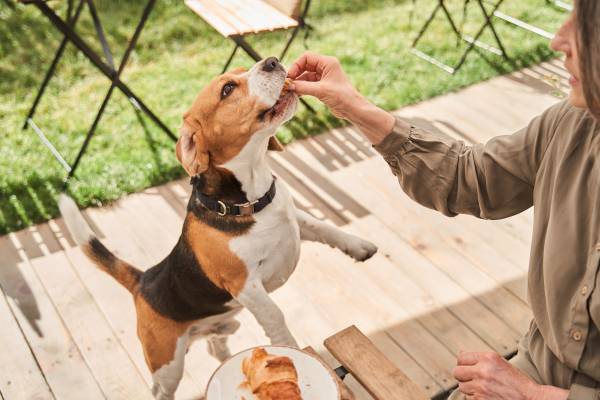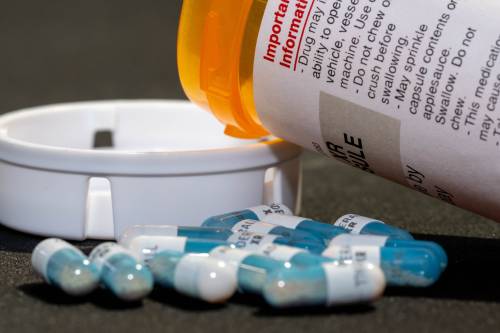Dogs do the strangest things sometimes! For instance, your fur baby may dig in the trash and find something to chew up, such as an aluminum can! Why on earth would your canine companion chew up an aluminum can? There’s no one answer that will explain this. However, we can tell you it’s a common problem, so you’re not alone. But what happens if a dog eats an aluminum can?
Connect with a verified veterinarian in minutes. Licensed vets are available 24/7 to answer your questions. No need to worry about your furry family member.
Has your dog eaten an aluminum can? Are you worried that the aluminum can will make your dog sick? If so, you’ve come to the right place. We understand it can be scary when your dog eats something like this.
We’ve gathered information about aluminum cans and whether they can make a dog sick. Let’s get started!

What is an Aluminum Can?
An aluminum can (sometimes called a “tin can”) is a single-use container that used to package food or drinks. For instance, aluminum cans are used to safely store soup, oil, milk, soda pop, and more.
The inside of the can is usually spray-coated with an epoxy lacquer or polymer to protect the aluminum from being corroded by acidic contents, such as carbonated pop. Most cans are made in two pieces, with a bottom and a body.
Aluminum cans are popular because they’re lightweight, keep the cost down, and they’re usually easy to open (no can opener is needed). In addition, aluminum cans don’t rust.
While aluminum cans are considered safe for food storage, what happens if a dog eats one of these cans? Can the aluminum can make a dog sick?
Aluminum Cans & Dogs
Unfortunately, aluminum cans are able to make a dog pretty sick.

Review symptoms, medications & behavior to keep your pets healthy with a Vet Online in just minutes.
Ask a Vet Live NowSymptoms of Aluminum Can Ingestion in Dogs
- You may notice these symptoms if your dog has eaten an aluminum can:
- Abdominal pain & bloating
- Diarrhea (may contain blood)
- Vomiting (may contain blood)
- Depression
- Excessive drooling
- Lethargy
- Loss of appetite or refusal to drink water
- Constipation
If you notice any of these symptoms in your dog, call the vet immediately. This is an emergency.
Treatment of Aluminum Can Ingestion in Dogs
The vet may do x-rays to determine if your dog ate the can and where it may be located in your fur baby’s GI system.
If your dog has eaten only a small piece of aluminum, the vet may prescribe a laxative for your dog. This will help the piece of aluminum to pass more easily and come out into your dog’s poop.
On the other hand, if your dog’s eaten a large part of the can, it may be lodged in his digestive tract. In that case, the vet will need to perform surgery to remove the aluminum can safely. They will also repair any damage the can may have done to your dog’s system.
The prognosis is best for dogs who receive prompt medical treatment after eating an aluminum can. In the future, it’s best to keep aluminum cans out of your dog’s reach. And it may be necessary to invest in a dog-proof wastebasket. You’ll both be happier for it!
Connect with a verified veterinarian in minutes. Licensed vets are available 24/7 to answer your questions. No need to worry about your furry family member.

Tom
Tom has always loved to write since he was little - he wanted to be either a writer or a veterinary doctor, but he ended up being a professional writer while most of his works are based on animals. He was born in San Francisco but later moved to Texas to continue his job as a writer. He graduated from the University of San Francisco where he studied biotechnology. He is happily married and a soon to be father!
Review symptoms, medications & behavior to keep your pets healthy with a Vet Online in just minutes.
Ask a Vet Live Now




